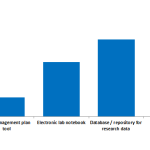Results of the user survey 2022: Part 2
Feedback from the pharmaceutical research community supports the continuous optimisation and development of all services of the FID Pharmazie and the PubPharm research platform. An online survey was conducted from July to September 2022 to specify user needs, identify potential services, and better understand user behaviour. Approximately 2,500 people from the 22 pharmacy universities in Germany were contacted and informed about the survey directly on PubPharm. In addition, the survey was advertised on the social media channels of the FID (PubPharm Blog, Twitter, LinkedIn) and events attended during this period (e.g., the Annual Meeting of the Deutsche Pharmazeutische Gesellschaft (DPhG)). Multipliers drew attention to this survey through their channels.
In Part 1, we presented the results of the questions about literature/information search and innovative search tools. In Part 2, we report on the results of research data management questions. The numbering of the figures follows Part 1.
The questionnaire, available in English and German, included three sections: general questions (e.g., about the field of activity), questions about literature/information search (e.g., on the use of search tools and functions) according to the self-assessment of the participants into “PubPharm users” (familiar with PubPham) and “PubPharm non-users”, questions on the innovative search tools developed at the Institute for Information Systems (IfIS) (including the Narrative Service), and finally questions on the topic of research data management.
155 persons participated in the survey, of which 117 (N) fully completed their questionnaire. The results were evaluated primarily based on the fully completed questionnaires. Percentages are rounded.
The results are used for the further development of the FID Pharmazie and optimisation of the services. For this purpose, the comment fields of incomplete questionnaires were also evaluated.
Research data management
The research data management questions were asked to all survey participants (N=117). First, they were asked whether they were already aware of the National Research Data Infrastructure (NFDI). Here, 81 respondents (69.2%) indicated that they were not aware of the NFDI, while 27 (23.1%) participants know the NFDI. In the following, specific questions about the responsible consortium NFDI4Chem were asked. This consortium is unknown to 92 (78.6%) of the respondents, with 14 (12.0%) stating they were aware of NFDI4Chem. It is worth taking a closer look at the distribution between PhD students, research associates, PostDocs and professors/junior professors. PhD students form the largest group (46; 39.3%), but only 4 (8.7%) of them are familiar with the NFDI, and only 2 (4.4%) have heard of the NFDI4Chem. Among the “professors/junior professors” group, 10 out of 19 (52.6%) are aware of the NFDI, and 4 out of 19 (21.1%) are aware of the NFDI4Chem.
In addition, the participants were asked which tools they know for successful research data management (Fig. 22). Databases and repositories for research data are the best known, followed by electronic lab notebooks, and data management plan tools are the least frequently known. Given that the German Research Foundation (DFG) requires a checklist (similar to a data management plan) for all new proposals, it is particularly interesting that these are the least known.
Regarding the question of whether a data management plan has ever been created using software, and if so, which one, most of the participants (101; 86.3%) indicated that they had not yet created one using software. Those who had already done so used Onenote and MYSQL for this purpose. Electronic lab notebooks were used by 20 (17.1%) respondents in the working groups, including Benchling, Labfolder, Chemotion ELN, and eLabFTW.
- Figure 22 to the question “There are different tools, that can help you to establish a successful research data management. Which of the following tools do you know?” (x=99 – total number of answers; multiple answers were possible)
76 (65.0%) participants also reported that they had not yet used a repository for research data, either to publish research data or to access data from others. 17 (14.5%) participants were already using a repository, including Zenodo, ArrayExpress, ShareCRF, and NCBI. In addition, some also used university repositories.
To the question “Do you have any specific suggestions or problems regarding research data that should be addressed?”, freely available software for laboratory journals with linking options and support for data formats for structural formulas, NMR spectra, etc., handling of large file sizes and training courses were mentioned.
From the responses on the topic of “research data management”, it can be concluded that almost all points of research data management have not yet reached a large number of researchers. Likewise, researchers would like to have specific training on the topic.

